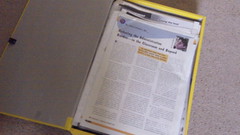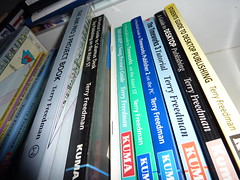 The term “automatic writing” is usually associated with a particular psychic phenomenon. However, software now exists that can take data, such as sports results, and generate reports from it.
The term “automatic writing” is usually associated with a particular psychic phenomenon. However, software now exists that can take data, such as sports results, and generate reports from it.
News & views
Books vs e-books
 I came across an interesting post by Jeff Thomas, in which he refers to an Infographic by Newsweek, which compares printed books with electronic or e-books. (An infographic, by the way, is a graphical or otherwise succinct way of presenting a lot of information quickly. Newsweek’s books vs e-books graphic is one of the few easily readable ones I’ve come across, but that’s neither here nor there.)
I came across an interesting post by Jeff Thomas, in which he refers to an Infographic by Newsweek, which compares printed books with electronic or e-books. (An infographic, by the way, is a graphical or otherwise succinct way of presenting a lot of information quickly. Newsweek’s books vs e-books graphic is one of the few easily readable ones I’ve come across, but that’s neither here nor there.)
A week to remember
Mind your language
Why I reject rejection slips
The value of clippings
 I feel a bit like the first person in Khalil Gibran’s story of The Gravedigger. It’s taken me years and years, but I am finally getting rid of boxes and boxes of my clippings, ie the articles I’ve had published.
I feel a bit like the first person in Khalil Gibran’s story of The Gravedigger. It’s taken me years and years, but I am finally getting rid of boxes and boxes of my clippings, ie the articles I’ve had published.
This is not out of necessity, even though they do take up a fair bit of room in our loft. It’s just that I’ve decided I don’t need them any more, which made me think: why does anyone need to keep their clippings?
I think there are three main reasons.
The basic rule of blog headlines
Brevity definitely IS the soul of wit
This afternoon I found myself in an emotionally challenging superfluous text situation. In other words, I became somewhat “wound up” by having to waste my time reading a long-winded sentence that was clearly designed to demonstrate the erudition of the writer rather than facilitate the understanding of the reader.
More on self-publishing
Integrity, journalism and PR
 I attended a very interesting Westminster Media Forum seminar recently on the subject of journalism and public relations (PR). I thought I’d write about these issues in relation to integrity in blogging. It's an article that has been developing in my mind for some weeks now, and the seminar has helped me to put a few of my thoughts in order.
I attended a very interesting Westminster Media Forum seminar recently on the subject of journalism and public relations (PR). I thought I’d write about these issues in relation to integrity in blogging. It's an article that has been developing in my mind for some weeks now, and the seminar has helped me to put a few of my thoughts in order.
Good news: you can succeed as a bad writer, apparently
Bad headlines
If there’s one thing that really annoys me it’s chapter headings and article headlines where you can’t tell what the subject matter is until you read it. Who needs a situation in which you don’t know if you want to read something until you have read it? The way I look at it is that if the author can’t even be bothered being clear when he’s trying to entice you to read his stuff, why should you be bothered to oblige him by reading it?
4 Reasons to get published
 It's important to be published by a traditional publisher
It's important to be published by a traditional publisher
Image by Terry Freedman via Flickr
In this day and age, in which anyone can publish and distribute their books electronically, or self-publish them by going down several routes (none of which need include the traditional vanity publisher), why should anyone bother approaching a traditional publisher? After all, very few of the thousands of manuscripts that publishers receive find their way into book form, and of those that do, very few hit the big time. There are, in fact, at least 4 reasons to try to get published by the age-old process of going to publishers.
10 attributes of professional writers -- #8: Pitch to the right outlet
Tools For the Writer
Using video for creative writing
 I always carry a pocket camcorder with me. It enables me to take both photos and videos. I use the videos as a potential basis for creative writing.
I always carry a pocket camcorder with me. It enables me to take both photos and videos. I use the videos as a potential basis for creative writing.
I try to make the videos only about 30 seconds long, because I like the idea of being minimalist – as you may have gathered from my article about using Twitter.
We don’t need no rules of grammar
 Back in April 2010 Steve Wheeler (@timbuckteeth) posted a useful article reminding students that when it comes to succeeding academically, accuracy in using the language still counts.He lists a set of rules which humorously make the point, such as "Avoid clichés like the plague." My question is: do the same rules apply to bloggers?
Back in April 2010 Steve Wheeler (@timbuckteeth) posted a useful article reminding students that when it comes to succeeding academically, accuracy in using the language still counts.He lists a set of rules which humorously make the point, such as "Avoid clichés like the plague." My question is: do the same rules apply to bloggers?
A new Facebook page and a new newsletter
10 attributes of professional writers – #1: Get paid!

Image by Terry Freedman via Flickr
What makes a professional writer professional? I believe 10 characteristics to be essential. The most fundamental of these is pretty simple, and has nothing whatsoever to do with technology, writing style or how good a tan you have. It’s…